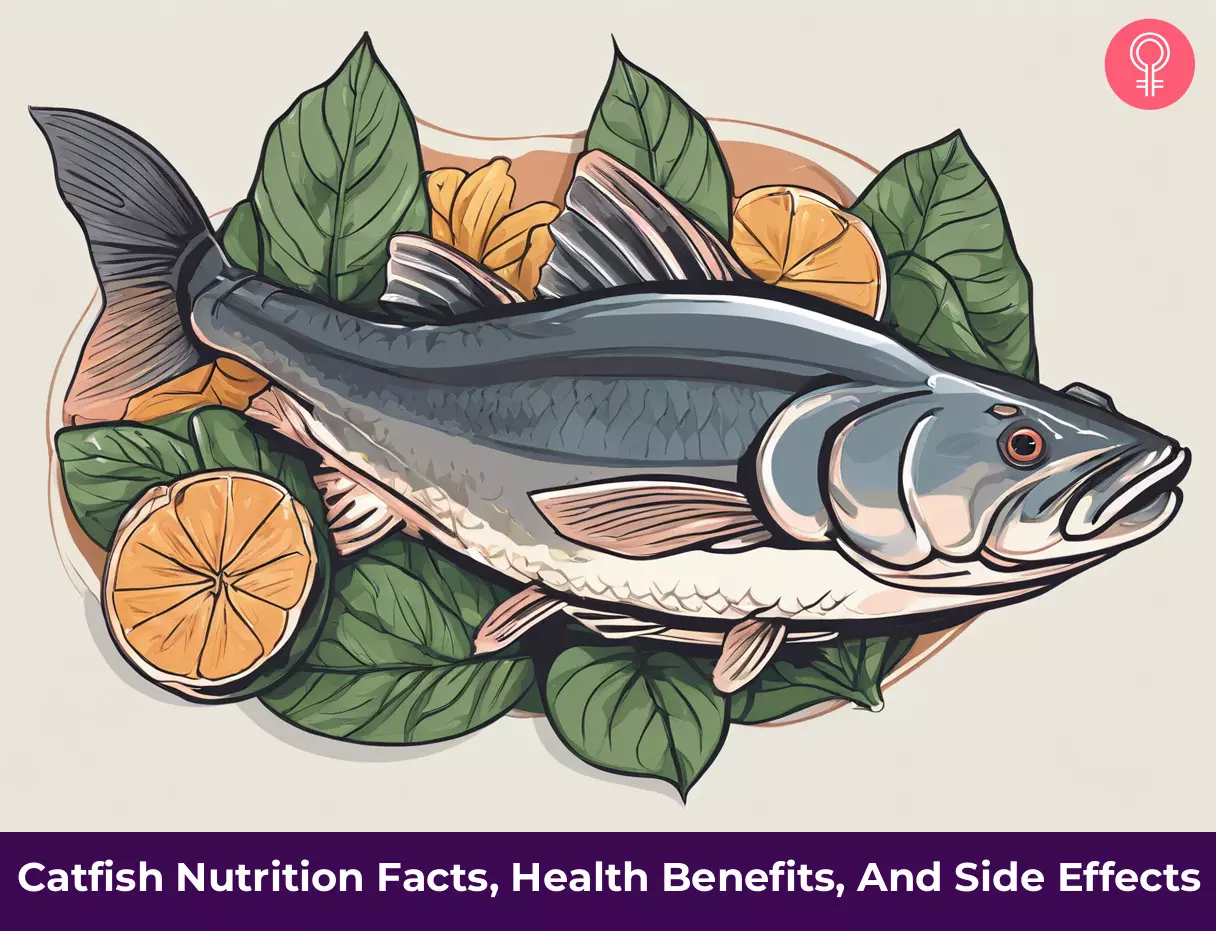According to the USDA, a 3.5-ounce (100-gram) serving of fresh catfish provides the following nutrients (1): Who Can Consume It? Can be safely consumed in moderation by all. How Often? Can be consumed daily in small amounts. Caution Excess consumption may lead to allergic reactions (rare) such as hives, nausea, vomiting, or digestive disorders. It may also increase the chances of mercury poisoning.
Besides being low in sodium and calories, catfish is a good source of healthy fats, protein, important vitamins, and minerals. Going ahead, let’s answer the popular question: Is catfish good for you? Read on to know about the various health benefits associated with catfish.
Health Benefits Of Catfish
Contains Health-boosting Omega-3 Fatty Acids
Omega-3 fatty acids are known for their potential role in maintaining cardiovascular health and helping proper brain functioning. Research has suggested regular intake of omega-3 helps improve signs of depression as well (2). A study on 23 individuals reported a 7% decrease in all-cause mortality with a regular consumption increase of 0.2g of omega-3 fatty acids (3). Catfish have white flesh and are relatively lean with a small amount of fat content. Even then, one fillet of catfish can provide you with 253 mg of omega-3 fatty acids (1). While other oily fish varieties might contain higher amounts of omega-3, this still is a reasonable amount to include in your diet. The omega-3 in catfish is in the most bioavailable forms of EPAi Eicosapentaenoic acid; found in seafood that has positive effects on coronary heart disease, high blood pressure, and inflammation. and DHAi Docosahexaenoic acid; found in fatty fish that improves brain health and functioning, high cholesterol, and high blood pressure. , and that means these get easily absorbed by our system.
Has Minimum Mercury Contamination
Mercury contamination of fish and seafood has recently been of a lot of concern (4). Mercury is known to build up easily in the body and can cause neurotoxicityi The damage that occurs to the nervous system when your brain is exposed to natural or manmade toxic substances like mercury and lead. and developmental issues in children (5). While large variations like swordfish, swai fish, sharks, and tuna are commonly known to have more concentrations of mercury, the catfish fares significantly well in this regard. As per FDA research between 1990-2012, catfish only contain 0.024 PPM (mean average mercury content) (6). Catfish is actually even better than the popular “low-mercury” options in fish like mackerel and herring.
Dense In Muscle-building Protein
Protein is important for building and maintaining lean muscle mass. It is also a “building block” responsible for the production of enzymes and hormones that affect every function of our body (7). Catfish is extremely protein-dense. 100 grams of catfish can offer you 18.5 grams of protein for only 105 calories (1).
Rich In Vital B Vitamins
Vitamin B12 is an essential vitamin, and it plays a crucial role in red blood cell formation, brain health, and DNA synthesis (8). Certain population groups, like pregnant women, infants, and the elderly, are more prone to a B12 deficiency (9). One fillet serving of catfish can provide you with 69% of the daily recommended intake of vitamin B12. Supplementing your diet with catfish can potentially help balance out any deficiencies. Lami Fearon, a blogger, shared her recipe of catfish pepper soup adding that nothing could cure a hangover faster than a hot and spicy soup. She also writes, “I remember when I was pregnant and suffered morning sickness, I ate whole catfish at least three times a week, the spice helped (i).”
May Improve Heart Health
Catfish is rich in omega-3 fatty acids that may offer significant advantages for heart health. Omega-3 fatty acids help reduce triglyceride levels in the body, which contributes to healthier blood vessels. Additionally, they exhibit anti-inflammatory effects that may lower the risk of atherosclerosis, a condition caused by fat buildup in the artery walls. Thus, the intake of these nutrients may support heart health by maintaining myocardial contractility, which is the ability of the heart muscles to contract. Moreover, these fatty acids may help improve cardiac structure and function. This may help in heart failure prevention and treatment (10). While further research is needed in this regard, the inclusion of catfish in your diet may contribute to these positive health outcomes. Now that we have seen the various catfish benefits, let’s see if these beneficial nutrients remain the same for both the farmed-raised and the wild catfish.
Wild-Caught Vs. Farm-Raised Catfish
Catfish is available all over the world and is commonly found as farm-raised catfish or wild-caught ones. While both these forms of catfish offer us the above health benefits, they have some nutritional differences. Catfish found in the wild are bottom feeders which means that they survive on algae, aquatic plants, fish eggs, and other fish found at the bottom of their water habitat. Farm-raised catfish on the other hand are fortified with additional feed that’s high in fatty acids, protein, antioxidants, vitamins, minerals, and probiotics (11), (12). These dietary differences can lead to significant differences in the nutrition value of a farm-raised catfish vs a wildly caught one. A study comparing the nutrient profiles of wild and farm-raised African catfish found that the wild variety had more protein, fiber, fat, and overall calories than the farm-raised ones (13). Another study on the Indian butter catfish reported that farm-raised fish had higher fat and iron content while the wild fish had higher levels of most other minerals (14). Having seen the differences between the farmed and wild varieties of catfish, let’s further see how the catfish differs from another commonly consumed fish, the tilapia.
Tilapia Vs Catfish – Basic Differences
Catfish and tilapia are very common fish found and farmed worldwide. You can distinguish tilapia vs catfish from the pointers in the table: Catfish benefits come from their omega-3 fatty acids and vitamin E content. While the former has more omega-3 fatty acids content, tilapia is richer in vitamin E. When it comes to their flavor, catfish has a strong fishy taste, while tilapia is milder. You can explore tilapia fish benefits if you want to learn more about it. without any distinctly unusual physical features. Now that we know the basic differences of tilapia vs catfish, let’s further understand if there are any side effects of including catfish in your diet.
Possible Side Effects And Allergies Of Catfish
Contaminants In Catfish
Fish and seafood can easily absorb toxins and harmful trace metals from their habitat waters. Upon eating, these contaminants can move into your system resulting in potential toxicities. Mercury is one such risky heavy metal that is found in most fish (15). It increases the potential risks of neurodegenerative disorders like Alzheimer’si A progressive condition that harms the brain cells and impairs important brain functions like thinking, memory, and natural behavior. and Autismi A developmental brain condition that impacts the nervous system and impairs cognitive, interactive, physical, and emotional functions. (16), (17). Catfish, with 0.024 ppm (mercury concentration mean) has the lowest mercury concentration amongst most fish making it preferably safer to consume in comparison (6). However, one should be careful of its fishing source and farming methods and avoid excess intake to avoid the possible intoxication from mercury.
Catfish Allergy
In 2008, catfish production exceeded that of salmon and led a group of scientists to compare the potential allergens (proteins in the fish that bind to human Immunoglobulin E (IgE) antibodies) in catfish and salmon. This particular study conducted on 77 children with fish allergies, reported more IgE-binding allergens in catfish than salmon (18). When you are exposed to potential allergens, your immune system produces IgE antibodies in response. These then release chemicals, causing an allergic reaction. Though catfish allergies are still not widely heard of, you should avoid excess intake and be careful of any symptoms of an allergic reaction after consumption, skin contact, or inhalation of catfish fumes while cooking. Talking of cooking, let’s quickly see some of the best cooking methods for catfish.
Best Cooking Methods For Catfish
Frying is a common and traditional method for cooking catfish. However, you can choose to grill, bake or broil the catfish as well to keep the fat intake in check. Let’s see how the different ways of cooking affect the major nutrient intake from a single 3.5oz (100g) serving of catfish (19), (20), (21). As seen from the above comparison, cooking with dry heat is the healthiest way to prepare catfish. Otherwise, you can opt for monounsaturated or polyunsaturated oils like canola or olive oil and low-sodium seasonings for the healthier preparation of catfish. You can pair the catfish preparation as a side dish with brown rice or couscous, some steamed vegetables, and salad to make it a wholesome nutritious meal. Here are a few recipes for you to try out:
Popular Recipes With Catfish
Lime Broiled Catfish
Ingredients
Butter -1 tablespoon Lime juice – 2 tablespoons Salt (optional) -½ teaspoon Pepper – 1/4 teaspoon Garlic powder – 1/4 teaspoon Catfish fillets (6 ounces each) – 2 Lime slices or wedges, optional Fresh parsley, optional
Instructions
Cornmeal Catfish
Ingredients
Cornmeal – ¼ cup Seafood seasoning – 1 teaspoon Catfish fillets (6 ounces each) – 4 Canola oil – 3 tablespoons Tomato (medium, chopped) -1
Instructions Is catfish better than salmon? No. Catfish contains fewer fatty acids when compared to salmon. So from a nutritional standpoint, salmon is the healthier fish to consume. Is catfish healthier than chicken? Catfish is healthier than chicken due to the presence of omega-3 fats in it. Is catfish high in vitamin D? Yes. One hundred grams of channel catfish contains 500 IU of vitamin D (22). Discover the health benefits of catfish and see if it is the right choice for you. Learn about its nutritional value and make informed decisions about your diet by watching the video below.
Illustration: Catfish Nutrition Facts Health Benefits And Side Effects












